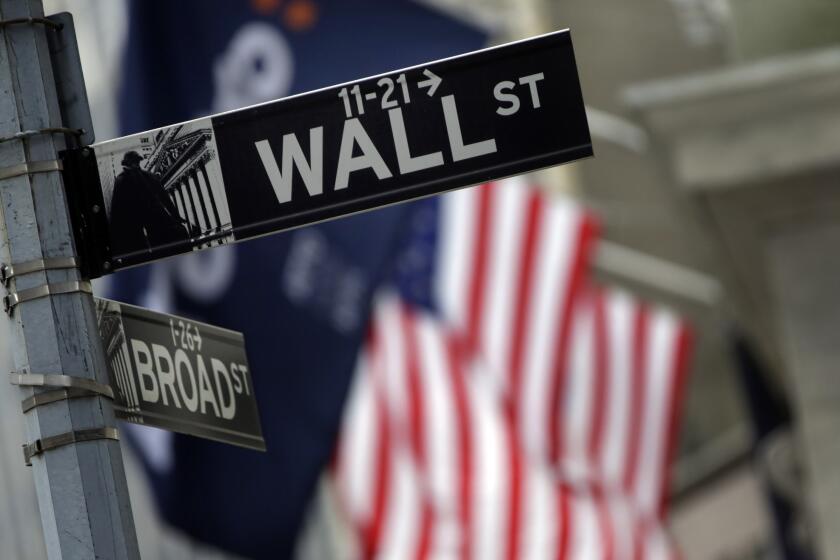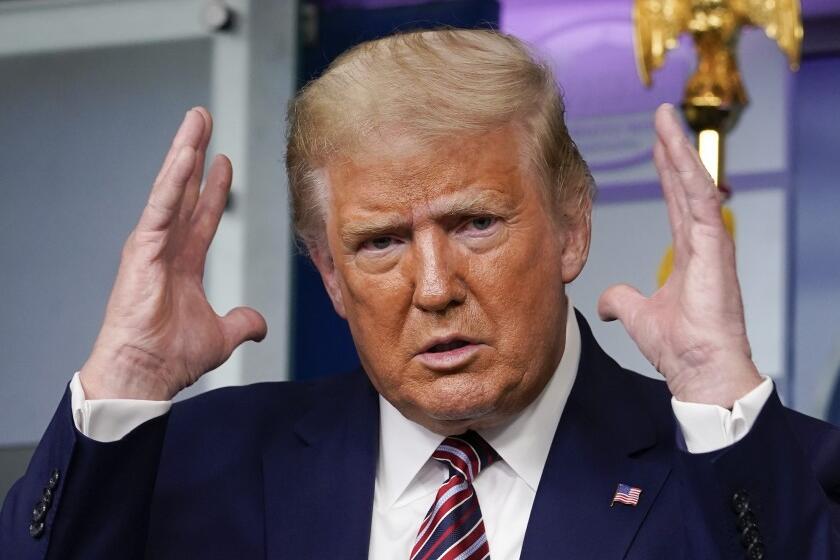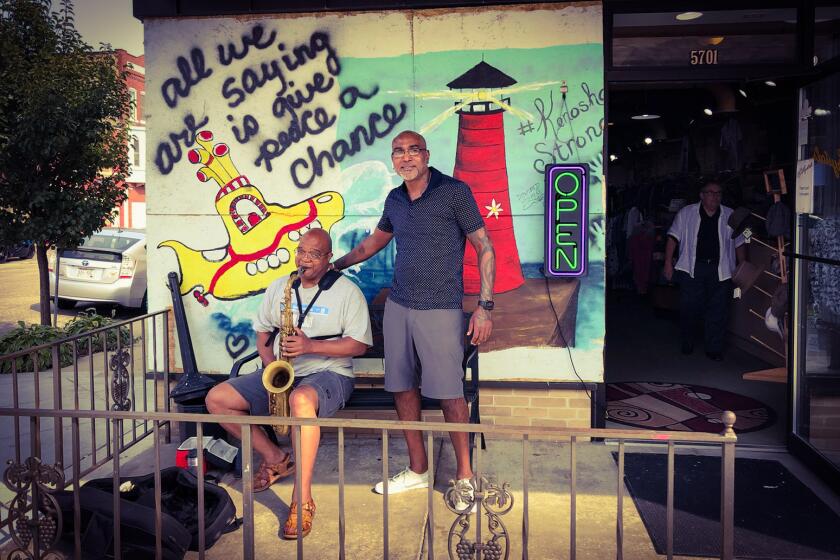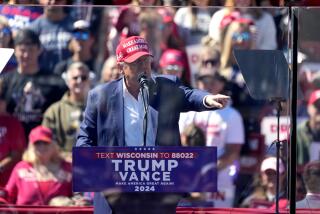In Wisconsin, Trump’s economic edge is blunted by COVID
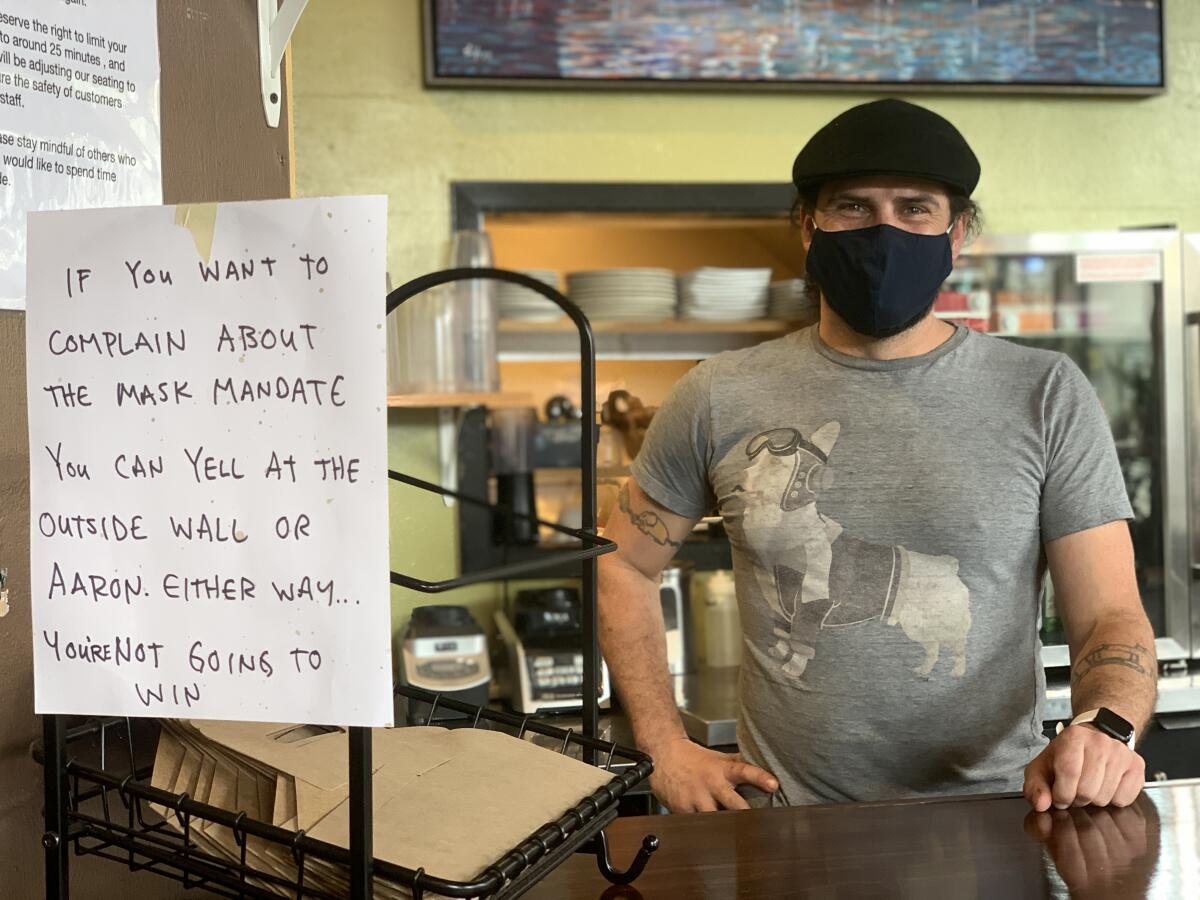
- Share via
OSHKOSH, Wis. — Shawn Quella can quickly rattle off a litany of economic challenges in his home state: the spike in unemployment this spring as the coronavirus spread, the favorite restaurants that have shut down, local retailers that struggle to stay open.
Nevertheless, the 30-year-old financial advisor’s view of the economy is sunny, with jobs partially rebounding this summer and a potential COVID-19 vaccine in the works. His optimism is based on the not-too-distant memory of the pre-pandemic boom and confidence that President Trump can replicate that past success.
“The trajectory that he had going — lowest unemployment in 50 years, stock market at all-time highs, economic growth,” Quella said. “There were a lot of good things in place, and I think he is set to continue that.”
Trump’s reelection prospects hinge on voters like Quella, a resident of Neenah, in Wisconsin’s Fox Valley — those who give the president high marks for his economic stewardship and don’t hold the recent downturn against him.
Eager to capitalize on a rare bright spot, the Trump campaign has redoubled its efforts to make the race a referendum on which candidate voters trust to bring the nation back to economic health, even as the president’s own well-being in his bout with the coronavirus dominates the nation’s attention.
But while voters have consistently given Trump the edge on the economy, interviews with residents of this battleground state help illustrate why his fiscal pitch has not swayed a politicized electorate where nearly every issue is viewed through a partisan lens.
Stocks dropped suddenly on Wall Street after President Trump ordered a stop to negotiations with Democrats over another round of stimulus for the economy.
Aaron Baer, a cafe owner in Oshkosh, a short drive south of Quella’s hometown, acknowledged that for most of Trump’s term, “the economy was good — very good.”
But that has not translated into him supporting the president, especially after the pandemic decimated much of his business and the administration’s response was, in his words, “ready, fire, aim.”
Trump’s electoral fate rests in the intersection of those two topics.
“There’s no question that the pandemic and the economy are the two big issues that are really intertwined,” said Larry Nelson, a Waukesha County supervisor and rare Democratic elected official in the conservative suburbs of Milwaukee. “One of the reasons the economy is doing so poorly is that the president still does not have a good national strategy for how to deal with the pandemic.”
News of Trump’s tax evasion plays to Biden’s ‘Scranton-vs.-Park Ave.’ campaign. It won’t upend the race, but it’s another hurdle for Trump.
Joe Biden, Trump’s Democratic challenger, has maintained a modest but steady polling lead in Wisconsin, a state that Trump won four years ago by fewer than 23,000 votes and which he badly needs to carry again if he is to remain in the White House.
Voters say they trust the former vice president more on handling the pandemic and easing racial tensions. Trump, meantime, has maintained a consistent, albeit narrowing, edge on whom voters prefer on the economy.
“It’s the only area of evaluation that is net positive” for the president, said Charles Franklin, director of the Marquette Law School Poll in Milwaukee.
Matt Mareno, chair of the Waukesha County Democratic Party, confirms that the polls reflect his experience phone-banking in support of Biden. The biggest pushback he has faced from voters is that many trust Trump on the economy.
“Republicans did a great job over the last 25 years saying that they’re the economic party,” Mareno said. But he’s been hearing that argument a lot less in recent days, he said.
Trump’s advertising in Wisconsin has been particularly focused on the economy; his most-aired television commercial here touts him as the “jobs president,” and much of his campaign mail accuses Biden of wanting to raise taxes. The Democrat has said he wants to raise taxes on the highest earners, plus close corporate tax loopholes.
The president’s argument is compelling to Quella, who has long backed the Republican Party both for its conservative fiscal outlook and for its opposition to abortion.
Voters in the battleground state of Wisconsin are using street art, church services and vigils for Black people killed by police to call not only for justice but also for Americans to restore their faith in one another.
“Raising capital gains rates, raising taxes right now would be detrimental to the economy that’s already struggling,” he said.
But for Hayley Holz, Trump’s economic pitch falls flat. The 22-year-old, a student at University of Wisconsin-Milwaukee, lost her job at a day-care center because of the coronavirus. She picked up a new paid job as an organizer at a student advocacy group but still feels anxious about paying her bills.
“I’ve been seeing these Trump ads, and they’re like, ‘Biden’s gonna raise taxes.’ That doesn’t concern me with the economy,” Holz said. “I’m a college student. I can’t afford to live on my own right now, and my friends can’t, my roommates can’t. We’re all just struggling.”

Usually, positive approval ratings on the economy would be a promising sign for an incumbent president. This year, however, of the three simultaneous crises buffeting the nation today — COVID-19, the economic downturn and the civil unrest over race relations — it is the coronavirus that holds the most sway, Franklin said.
“If you like him better [than Biden] on the economy and like him a little worse on coronavirus, then the coronavirus will have a little more on your impact on the vote than the positive side on the economy,” Franklin said.
Both here and nationwide, the economy has bounced back some from the devastation of the spring. In Wisconsin, unemployment surged to more than 13% in April, but it has steadily fallen over the summer to 6%, roughly double what it was for most of Trump’s presidency.
Clients have increasingly returned to Salon La Rousse in Oshkosh, but that hasn’t done much to ease owner Tamara Ybarra’s anxiety.
“I feel a little apprehensive because I don’t think we’ve seen the worst of COVID,” said Ybarra, 38, who declined to state her preference in the presidential election, given the even split in political leanings among her customers.
Ybarra’s worries are understandable. Wisconsin is in the throes of a troubling coronavirus outbreak. Its climbing numbers, plus Trump’s COVID-19 infection, have pushed the pandemic to the top of Ybarra’s election concerns.
“We need somebody who is going to take this seriously,” she said.
Some of the highest case counts in the state are in the Fox Valley — a Republican-leaning region that’s now hotly contested in the presidential race and that both Trump and Biden have recently visited.
Across the street from Ybarra’s salon sits Baer’s New Moon Café, which is hanging on through takeout orders and drastically reduced indoor seating. Baer said he thinks partisan allegiance will override attitudes about the economy.
“I think people are just cemented. Around here, you’re either one side or the other,” Baer, 44, said. Though he has voted for both parties in the past, this year he’s siding with Biden.
For the narrow band of voters who have not yet made up their mind, emphasizing the economy may still be Trump’s best bet. That’s especially so with white college-educated men, a voting bloc that handily sided with Trump in 2016, according to national exit polls. The president appears to have lost traction with some of those voters this year; a recent NBC News/Marist Poll in Wisconsin, for example, found Biden and Trump tied among that group.
The battle for those voters is being waged in the WOW (Waukesha, Ozaukee and Washington) counties, a constellation of suburban areas around Milwaukee that have long been a gold mine for Republican ballots.
David Barnett sees opportunity for Biden to make inroads in the affluent community along Beaver Lake, in the northwestern part of Waukesha County. Barnett, an independent-minded Democrat, said he’s had plenty of conversations with Republican neighbors turned off by Trump’s behavior. But he fears that Biden hasn’t offered a strong rebuttal for Trump’s economic message.
“He has to counter what Trump is saying about lowering taxes,” said Barnett, 74, who owns an art gallery in downtown Milwaukee. He had been unimpressed with the Biden campaign’s effort to do so, although he said the Democrat’s ads seemed more convincing in the last week.
The area still has many rock-ribbed conservatives who will not be easily swayed, no matter Biden’s pitch. Kerry Johnson, a retired diesel-engine salesman from Waukesha, admires Trump’s hardline approach to foreign trade.
“He’s a businessman,” Johnson, 68, said. “And he’s treating the government like a business — which it should be.”
But those economics-based arguments no longer have quite as much power as they once did. Although nobody expects Biden to flip the region blue this year, he may be able to reduce Trump’s margin.
Jim Jackson, a longtime Republican from Waukesha, was so turned off by Trump’s behavior that he’s now actively encouraging others to vote for Biden.
“I always thought Republicans were fiscally very conservative. Trump just spends and spends and spends,” said Jackson, 70, a retiree who used to run a local business alliance. “What I tell my friends is, if you’re voting for Trump because he’s a Republican — he’s not. He just does what’s good for Donald Trump.”
More to Read
Get the L.A. Times Politics newsletter
Deeply reported insights into legislation, politics and policy from Sacramento, Washington and beyond. In your inbox three times per week.
You may occasionally receive promotional content from the Los Angeles Times.
